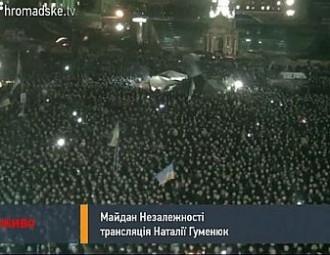The agreement on the Settlement of Crisis signed, Maidan presented Yanukovich with an ultimatum

The settlement signed between Yanukovich and opposition provide for the Constitutional reform and pre-term presidential elections.
The elections are to take place immediately after the new Constitution is adopted, but no later than in December 2014, the agreement says. However, if before 10 a.m. on February 22 Yanukovich doesn’t resign, people say they will assume the armed offensive.
Maidan hissed off the opposition leaders, who announced about the signed agreement on the Settlement of Crisis.
A speech of Vitaliy Klitschko was interrupted by one of Maidan’s participants, who walked out on the stage and stated that if before 10 a.m. on February 22 President Viktor Yanukovich doesn’t resign, people will assume the armed offensive.
“We all made this crucial point happen. We gave a chance for the politicians to become future ministers, presidents, and they don’t want to fulfil our only demand – to clear out the criminal!”
The people at Maidan actively supported this statement.
As UNIAN informed, earlier on February 21 President of Ukraine Victor Yanukovich and three opposition leaders – leader of the Political Council of the Batkivshchyna Arseniy Yatsenyuk, leader of the UDAR party Vitaliy Klitschko and leader of the Svoboda All-Ukrainian Union Oleh Tyahnybok – signed the agreement.
Foreign Minister of Germany Frank-Walter Steinmeier, Foreign Minister of Poland Radosław Sikorski, Director at the Continental Europe Department of the French Foreign Ministry Eric Fournie witnessed signing of the agreement.
However, Russian ombudsman Vladimir Lukin was not present at signing ceremony. He told ITAR-TASS that “there’s no clarity on who will fulfill these agreements and how they will be fulfilled, and that’s why I didn’t put my signature,” adding that “as soon as there’s clarity in the sphere, we’ll be able to return to Kiev and to continue negotiations”.
The text of the agreement on the Settlement of Crisis in Ukraine was published at the webpage of the Ukrainian President. The agreement states that “within 48 hours of the signing of this agreement, a special law will be adopted, signed and promulgated, which will restore the Constitution of 2004 including amendments passed until now” and “constitutional reform, balancing the powers of the President, the government and parliament, will start immediately and be completed in September 2014”.
Presidential elections will be held as soon as the new Constitution is adopted but no later than December 2014.
Investigation into recent acts of violence will be conducted under joint monitoring from the authorities, the opposition and the Council of Europe.
The authorities will not impose a state of emergency. The authorities and the opposition will refrain from the use of violence. The Parliament will adopt the 3rd amnesty, covering the same range of illegal actions as the 17th February 2014 law. Both parties will undertake serious efforts for the normalization of life in the cities and villages by withdrawing from administrative and public buildings and unblocking streets, city parks and squares. Illegal weapons should be handed over to the Ministry of Interior bodies within 24 hours of the special law, referred to in point 1 hereof, coming into force.
After the aforementioned period, all cases of illegal carrying and storage of weapons will fall under the law of Ukraine. The forces of authorities and of the opposition will step back from confrontational posture. The Government will use law enforcement forces exclusively for the physical protection of public buildings.
The Agreement ended with the provision, in which Foreign Ministers of France, Germany, Poland and the Special Representative of the President of the Russian Federation call for an immediate end to all violence and confrontation.
-
03.01
-
07.10
-
22.09
-
17.08
-
12.08
-
30.09










































